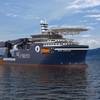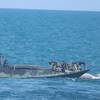IMO Addresses Marine Litter Issue
Understanding the impact of plastic litter found at sea and how to get rid of it was at the heart of discussions in Nairobi Kenya, (11-15 March) at a side-event called Sea-Based Sources of Marine Litter, in the margin of the UN Environment Assembly.
Sea-based sources of marine litter, in particular from the fishing and shipping industries are a significant component of marine litter with severe impacts on the marine environment, food security, animal welfare and human health, safety and livelihoods.
International Maritime Organization (IMO) addressed the audience, showing how it plans to further tackle the issue through its action plan, adopted in 2018, which aims to enhance existing regulations and introduce new supporting measures to reduce marine plastic litter from ships.
Even though IMO pioneered the prohibition of plastics' disposal from ships anywhere at sea almost 30 years ago, it is constantly reviewing practices in order to improve them. More details about its action plan was shared at the event, such as the use of adequate reception facilities at ports and terminals for the reception of garbage and its recommending that "all shipowners and operators should minimize taking on board material that could become garbage".
A minute of silence was observed, in honour of fellow UN colleague Joanna Toole, who had planned to be in attendace at this event, but was sadly involved in the tragic Ethiopian airline crash.
The event was co-organized by the Food and Agriculture Organization of the United Nations (FAO), UN Environment, the Global Partnership on Marine Litter (GPML) the Ocean Conservancy and the Global Ghost Gear Initiative.












